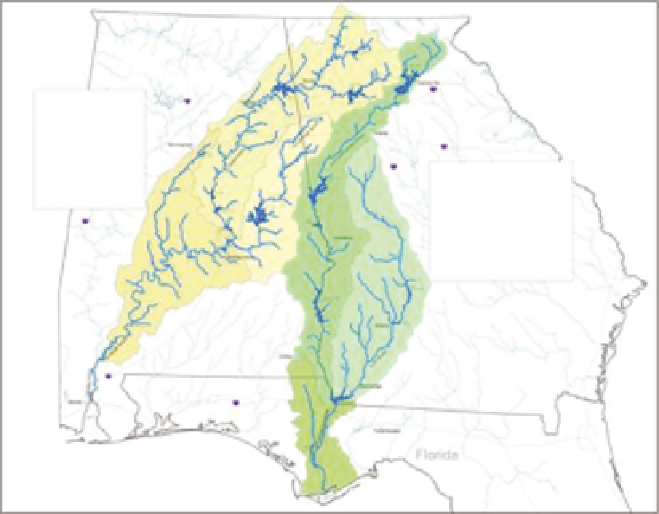Environmental Engineering Reference
In-Depth Information
Alabama
Alabama
Georgia
Coosa
Apalachicola
Tallapoosa
Chattahoochee
Flint
Florida
FIGURE 3.32
ACT and ACF basins. (From Atlanta Regional Commission, Tri-State Water Wars Resource
Center.)
ACT and ACF basins, which were oficially ratiied by Congress in 1997. However, the states could
not reach an agreement on these compacts and they have since expired without resolution, in 2003
for the ACF and in 2004 for the ACT, after which the legal battles and tri-state water wars resumed.
An example for groundwater is illustrated by a conlict between Mississippi and Memphis,
Tennessee. Mississippi state water law (Code of 1972 as amended) states that:
§ 51-3-1 'All water, whether occurring on the surface of the ground or underneath the surface of the
ground … belong to the people of this state,'
A problem is that the city of Memphis, Tennessee, through its pumping of groundwater, cre-
ates a cone of depression that results in groundwaters lowing from Mississippi to Tennessee. In
November 1998, the Memphis newspaper,
The Commercial Appeal
, reported that Memphis “is the
largest user of Mississippi's ground water.” In February 2005, Mississippi's attorney general iled
an action against Memphis and Memphis Light, Gas & Water (MLGW) in the U.S. District Court
for the Northern District of Mississippi, claiming that over a 40-year period MLGW diverted and
unlawfully took over 363 billion gallons of groundwater owned by Mississippi to provide between
15% and 22% of Memphis' water supply and sales requirements and claiming 1.3 billion dollars in
damage. In 2010, the suit went to the U.S. Supreme Court, which refused to hear the case without
comment, but the water wars continue.
3.7 MANAGEMENT ALTERNATIVES
The majority of our streams and rivers are, and will remain, regulated. However, today, manage-
ment efforts are directed toward restoring the remaining free-lowing rivers and streams or restor-
ing regulated streams.

Search WWH ::

Custom Search